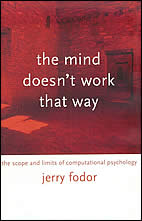 Leí este libro hace unos años. No entendí nada. No sé si no estaba preparado y me faltaba background para entenderlo o Fodor emplea un lenguaje tan enrevesado que es difícil enterarse. En cualquier caso, es una crítica de la idea computacional de la mente y su título es una evidente referencia a Cómo funciona la mente de Steven Pinker. Quizá el título sea un poco injusto, porque Pinker admitía ya desde el principio que no iba a explicar el funcionamiento da la mente en su libro (muy largo, por cierto) sino más bien lo que se sabía y que quizá algún día ayude a explicar el funcionamiento de la mente.
Leí este libro hace unos años. No entendí nada. No sé si no estaba preparado y me faltaba background para entenderlo o Fodor emplea un lenguaje tan enrevesado que es difícil enterarse. En cualquier caso, es una crítica de la idea computacional de la mente y su título es una evidente referencia a Cómo funciona la mente de Steven Pinker. Quizá el título sea un poco injusto, porque Pinker admitía ya desde el principio que no iba a explicar el funcionamiento da la mente en su libro (muy largo, por cierto) sino más bien lo que se sabía y que quizá algún día ayude a explicar el funcionamiento de la mente.
Ahora he vuelto a encontrar una referencia a este libro leyendo Nature via Nurture de Ridley y he decidido volver a leerlo. Quizá esta vez tenga más suerte.
In this engaging book, Jerry Fodor argues against the widely held view that mental processes are largely computations, that the architecture of cognition is massively modular, and that the explanation of our innate mental structure is basically Darwinian. Although Fodor has praised the computational theory of mind as the best theory of cognition that we have got, he considers it to be only a fragment of the truth. In fact, he claims, cognitive scientists do not really know much yet about how the mind works (the book’s title refers to Steve Pinker’s How the Mind Works). Fodor’s primary aim is to explore the relationship among computational and modular theories of mind, nativism, and evolutionary psychology. Along the way, he explains how Chomsky’s version of nativism differs from that of the widely received New Synthesis approach. He concludes that although we have no grounds to suppose that most of the mind is modular, we have no idea how nonmodular cognition could work. Thus, according to Fodor, cognitive science has hardly gotten started.
<
p class=»media»>[Estoy escuchando: «Canon per Augmentationem in contrario moto» de Juilliard String Quartet en el disco Bach — Die Kunst Der Fuge, Vol. II]
Aquí entre nosotros, ni uno ni otro aportan nada interesante y son completamente prescindibles.